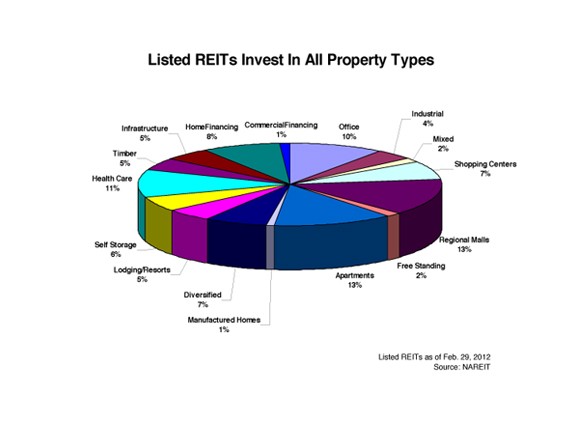Types of REITs
Post on: 30 Март, 2015 No Comment

To qualify as a REIT, a company must comply with a number of requirements, including having most of its assets and income tied to real estate investments and distributing at least 90 percent of its taxable income to shareholders annually in the form of distributions.
Equity REIT
Equity REITs are the most common type of REIT and purchase, own and manage income-producing real estate properties. Equity REITs may be beneficial for long-term investors because, in addition to potentially earning dividends from rental income, investors also receive any capital gains from the sale of properties.
Mortgage REIT
Mortgage REITs lend money directly to real estate owners and their operators, or indirectly through acquisition of loans or mortgage-backed securities. They do not invest in properties, but generate revenue through the interest paid on their mortgage loans.
Hybrid REIT
Hybrid REITs are a combination of equity and mortgage REITs.
A further REIT classification is based on how shares of the REIT can be purchased and held. REITs can either be publicly traded, public non-traded or private.
PublicLY Traded REITs
Traded REITs have shares listed on a national securities exchange (such as the New York Stock Exchange [NYSE]).They are registered with and regulated by the U.S. Securities and Exchange Commission (SEC) and required to file certain reports with the SEC pursuant to federal securities laws, including quarterly and annual reports. Traded REITs are more liquid than non-traded REITs; however, they are subject to the same market fluctuations and volatility as other exchange-traded stocks.
Public Non-Traded REITs
Non-traded REITs are also registered with and regulated by the SEC and required to file certain reports with the SEC pursuant to federal securities laws, including quarterly and annual reports. However, non-traded REITs are not listed on any public securities exchange, making them less liquid than their traded REIT counterparts. Non-traded REITs are generally considered more stable and less volatile than traded REITs because they are not subject to the same stock market fluctuations as traded REITs. However, non-traded REIT investors generally do not have the ability to realize any gain on the sale of their shares until the REIT completes its cycle of fundraising, operation and liquidation. Moreover, the price per share received by an investor upon liquidation may not necessarily reflect the value of the company. Investors must meet minimum eligibility requirements to invest in non-traded REITs.
Private REITs
Private REITs are not registered with the SEC or traded on a securities exchange and are subject to less regulation, with the exception of guidelines associated with qualifying and maintaining REIT status.














